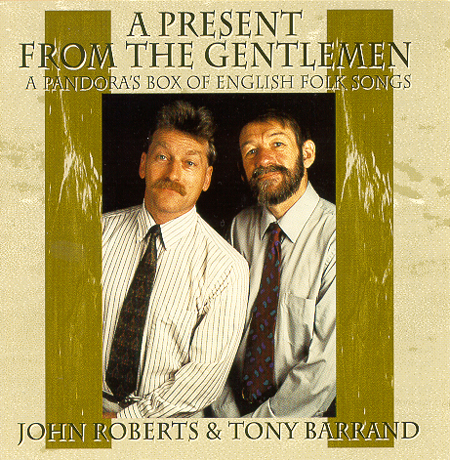 | ||||||||||||||||||||||||||||||||||||||||||||||||||||||||||||||||
|
GHM-101 A Present from the Gentlemen | ||||||||||||||||||||||||||||||||||||||||||||||||||||||||||||||||

|
||||||||||||||||||||||||||||||||||||||||||||||||||||||||||||||||
| ||||||||||||||||||||||||||||||||||||||||||||||||||||||||||||||||
| Lyrics for each song can be accessed by following the links in the playlist above. | ||||||||||||||||||||||||||||||||||||||||||||||||||||||||||||||||
| TECHNICAL INFORMATION | ||||||||||||||||||||||||||||||||||||||||||||||||||||||||||||||||
|
John Roberts: Vocals, English & Anglo concertinas, banjo. Recorded and mixed at Soundesign, Brattleboro VT. |
||||||||||||||||||||||||||||||||||||||||||||||||||||||||||||||||
| SONG NOTES | ||||||||||||||||||||||||||||||||||||||||||||||||||||||||||||||||
|
Adieu Sweet Lovely Nancy comes from the long-standing harmony-singing tradition of the Copper family of Rottingdean, in Sussex. Their version was published in the first issue of the Journal of the Folk Song Society, Vol.1, No.1, in 1899. We learned Jackie Munro and Nine Times a Night from the singing of A.L. Lloyd, who reworked and reintroduced a large number of traditional songs into the repertoire. A Smugglers' Song is from Rudyard Kipling's Puck of Pook's Hill. Kipling lived for a while in Brattleboro, VT, which Tony now calls home. This setting is by our good friend, the late Peter Bellamy. Our Hamlet is by Adam MacNaughtan, a Glasgow singer and teacher, who crafted it to impress some of the finer points of English Literature on inner-city schoolchildren. John learned this Anglicized version from Martin Carthy. Sam Hall is one of the classics of the early Music Hall, though it came to the stage from the folk tradition. W.G. Ross sang it to great acclaim in the 1850's. The Fellow that Played the Trombone is also a Music Hall piece; we have it from the Suffolk singer Jimmy Knights, whose rendition may be heard on the Topic recording, Sing, Say & Play. The Three Butchers is from the singing of Henry Burstow. Lucy Broadwood noted it down from him in 1894, and included it in her English Traditional Songs and Carols. Cecil Sharp (C#, as he styled himself) collected Robin Hood and the Bishop of Hereford, and published it in the Journal. The Outlandish Knight is a Lincolnshire variant, found more recently, in 1957. It is in Patrick O'Shaughnessy's More Folk Songs from Lincolnshire. The Painful Plough is from William Barrett's English Folk Songs. Draggletail Gypsy was collected by C# from Shepherd Haden, of Bampton, Oxfordshire. The air is a variant of the first part of The Princess Royal, an ancient tune which has sometimes been attributed to the Irish harper Turlough O'Carolan. We give the tune as it is used in Bampton for a morris jig. We got Dog and Gun from the Derbyshire group Muckram Wakes; many traditional versions are remarkably similar. One closely-related set of verses was written down by Tim Connor, an American sailor who compiled a notebook of songs when imprisoned in England during the Revolutionary War. Our World War I Trilogy includes The Old Barbed Wire, a soldier's view of life at the front; There's a Long, Long Trail, a marching song composed in 1913 by Zo Elliott and Stoddard King; and Valley of The Shadow, written by Paul Clark for a play called Days of Pride, produced at Stantonbury Theatre in 1981. This last is based on Hawtin Mundy's recollections of the Battle of Arras. |
||||||||||||||||||||||||||||||||||||||||||||||||||||||||||||||||
|
© Golden Hind Music |
||||||||||||||||||||||||||||||||||||||||||||||||||||||||||||||||